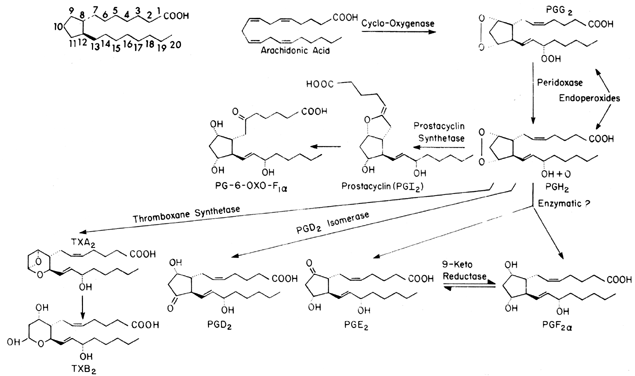

Acetaminophen relieves pain by elevating the pain threshold, that is, by requiring a greater amount of pain to develop before a person feels it. Prostaglandins are chemicals that cause inflammation and swelling. We are now able to manage efficiently problems such as intrauterine fetal death and intractable hemorrhage from postpartum uterine atony that often resulted in a surgical procedure prior to the availability of prostaglandin. It may reduce the production of prostaglandins in the brain. Modification of the naturally occurring prostaglandins by blocking the sites that are affected during their usual rapid metabolism, results in products with much longer durations of action, efficacy at much lower concentrations, and a potential for significant savings in cost.
#ACTIO. OF PROSTAGLANDINS SERIES#
Although both F and E series prostaglandins result in uterine contractions, E series prostaglandins are relatively more uteroselective and are clearly superior to F series prostaglandins in producing cervical ripening. This allows for the use of prostaglandins in usual doses throughout pregnancy. Unlike oxytocin which requires an induction of receptors that does not usually occur until the later part of pregnancy, prostaglandins receptors always are present in myometrial tissue. Of the multitude of products derived from the actions of cyclooxygenase on arachidonic acid, the most important for labor, delivery, and the postpartum period are the F and E series prostaglandins. Significant advances, however, have been made in the application of prostaglandins to common clinical problems in obstetrics. Similarly, administration of prostaglandins for the purpose of inducing labor or ripening an unfavorable cervix is tempered by the effects of these agents in other systems, including the gut and brain. Attempts to inhibit the production of prostaglandins to produce a reduction in myometrial contractility are limited by the important role of prostaglandins in maintenance of fetal ductal flow and renal blood flow. Prostaglandins are produced by almost every tissue in the body and serve as important messengers or effectors in a wide variety of functions. The pivotal role of prostaglandins in contraction of the smooth muscle of the uterus and the biophysical changes associated with cervical ripening, however, point to a major problem with their clinical use. Indeed, a much stronger case can be made for the role of prostaglandins in labor than can be made for oxytocin. It appears certain now that, at least in some cases, prostaglandins are important mediators of uterine activity. The use of prostaglandins in obstetrics has undergone a rapid evolution since their discovery in the early 1970s.


 0 kommentar(er)
0 kommentar(er)
